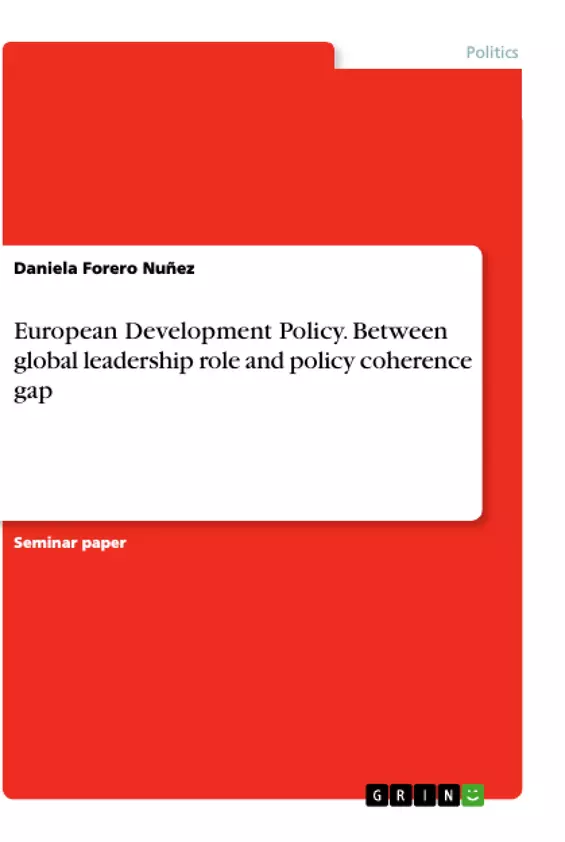In light of the latest global developments, the search for all-embracing solutions based on multilateral cooperation, mutual trust and solidarity has underlined the need for global leadership, which the European Union (EU) is aiming to personify. After almost three decades since the signing of the Maastricht Treaty, the EU continues to play a major role in the international sphere and serves as a role model for strengthened cooperation beyond territorial borders. Nevertheless, the 21st century has been heavily marked by enormous challenges around the globe that do not stop at a national state’s borderline.
Recent crisis, no matter if of humanitarian, political, environmental or financial nature have widened the existing inequality gap between the Global North and South, exacerbated social upheaval and eroded the legitimacy of several governments worldwide, bringing the efficacy of international cooperation in question. The European Development Policy aims to foster sustainable development and stability in developing countries, with the ultimate goal of eradicating extreme poverty. The following paper attempts to examine the coherence of the EU Development Policy, analyzing to what extent has the EU accomplished to translate its broad framework of principles, objectives and instruments into action.
Inhaltsverzeichnis (Table of Contents)
- Introduction
- Basic logic and structure of the EU Development Policy
- Key objectives and fundamental principles
- Legal and institutional framework
- Main financial instruments of development cooperation
- 27 Member states, one Development Policy: Path towards a united development approach
- Accomplishments of the European Consensus on Development
- Challenges of the power relations with third states
- New perspectives for an EU Development Policy of long-term impact
- Conclusion
Zielsetzung und Themenschwerpunkte (Objectives and Key Themes)
The aim of this paper is to analyze the coherence of the EU Development Policy, examining whether the EU has effectively translated its framework of principles, objectives, and instruments into action. It explores the basic logic and structure of the policy, focusing on developments introduced within the Treaty of Lisbon in 2009 and subsequent agreements. The paper examines the EU's leadership role and credibility in development cooperation and assesses challenges concerning power relations with third states that may have hindered the achievement of the policy's objective of promoting sustainable development and poverty eradication.
- The coherence of the EU Development Policy
- The EU's role in development cooperation
- Power relations with third states
- Challenges to the EU Development Policy
- The effectiveness of development aid and policy coherence
Zusammenfassung der Kapitel (Chapter Summaries)
- Introduction: This chapter sets the context for the paper, highlighting the need for global leadership and the EU's role in addressing global challenges, particularly those related to poverty and inequality. It introduces the European Development Policy and its aim to promote sustainable development and stability in developing countries.
- Basic logic and structure of the EU Development Policy: This chapter delves into the key objectives and fundamental principles of the EU Development Policy, emphasizing the importance of poverty eradication, sustainable development, and promoting democracy, human rights, liberalism, and the rule of law. It also examines the legal and institutional framework of the policy, including the Treaty of Lisbon and the European Consensus on Development.
- 27 Member states, one Development Policy: Path towards a united development approach: This chapter explores the challenges and accomplishments of the European Consensus on Development, analyzing the impact of power relations with third states on the coherence of the EU Development Policy. It also examines new perspectives for a long-term impact of the EU Development Policy.
Schlüsselwörter (Keywords)
The main keywords and focus topics of this text are: European Development Policy, EU Development Cooperation, global leadership, poverty eradication, sustainable development, policy coherence, power relations, third states, Treaty of Lisbon, European Consensus on Development, development aid, aid effectiveness, institutional framework, legal framework, and aid fragmentation.
- Quote paper
- Daniela Forero Nuñez (Author), 2021, European Development Policy. Between global leadership role and policy coherence gap, Munich, GRIN Verlag, https://www.hausarbeiten.de/document/1035656


